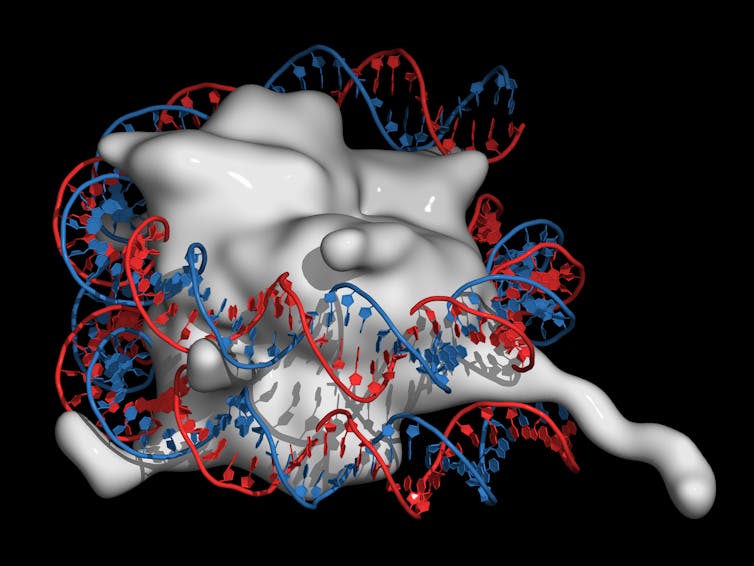Extreme stress in childhood is toxic to your DNA
Separating children from their parents is not just a psychological stress, it's a DNA stress. Scientific research shows that early life stress may have irreversible effects on how DNA works in the cells of the body.

The real danger of separating children from parents is not the psychological stress – it’s the biological time bomb. The screaming and crying, the anguish and desolation is gut-wrenching. But the fallout pales in comparison to the less visible long-term effects that are more sinister and dangerous.
Separating children from their parents, in a strange land, among strangers, causes the most extreme life stress a child can experience. And it causes profound and irreversible changes in how their DNA is packaged and which genes are turned on and off in the cells of the body, in organs like the pancreas, the lungs, heart and brain – leading to lifelong changes in its structure and function.
I am the director of the Lieber Institute for Brain Development and the Maltz Research Laboratories at the Johns Hopkins University School of Medicine, where scientists study how genes and the environment shape the development of the human brain.
Our studies and those of many other researchers around the world have shown that early life stress alters how DNA is packaged, which makes cells function differently than their original mandate.
How DNA is packaged alters its function
How DNA, the blueprint of life, is packaged in cells dictates how cells function. Virtually every cell in the body has the same DNA, as they are all descendants of that first fertilized egg. But a liver cell knows it’s not a lung cell, which knows it’s not a brain cell. The way the cells “know” has to do with how the DNA in cells is packaged, a process called “epigenetics.”

DNA is organized in a complicated protein package, which acts like insulation, protecting the DNA strand. This insulation determines which genes are activated to make the proteins required by a particular cell. Between the various tissues and organs, the packaging of DNA varies – like a liver cell versus a lung cell – allowing each cells to have a unique collection of proteins.
Studies of children who have experienced major early childhood stress reveal that dysfunction in many organs in the body years after the stressful event, raising the risk of heart disease, lung disease, high blood pressure, diabetes, poor school performance, drug abuse and mental illness. Scientists in the institute where I work have recently shown that the sensitivity of DNA packaging to environmental stress is greater during the first five years of life than all of the rest of life combined.
Harry Harlow, a psychologist at the University of Wisconsin, performed a controversial series of studies in the 1950s on infant monkeys that were isolated from their mothers for a few months – a similar situation to the period of separation experienced by young immigrant children at our borders, which is getting even longer in spite of the latest policy. Harlow’s infant monkeys became profoundly disturbed for the rest of their lives.
When these monkeys reached adulthood, studies revealed significant alterations in the structure and chemistry of their brains. Research in Romanian orphanages focusing on human children reared without parental support also show significant increases in the frequency of later life psychological and social disabilities as well as medical illnesses and changes in the anatomy of the brain.
Perhaps the best-known research on this subject was with children raised in Romanian orphanages in the 1980s and 1990s. In their compelling book “Romania’s Abandoned Children: Deprivation, Brain Development, and the Struggle for Recovery,” Nathan Fox of the University of Maryland, Charles Nelson of Harvard and Charles Zeanah of Tulane document the devastating impact of institutions on infants who are deprived of their parents’ emotional support. In addition to profound behavioral and intellectual problems, the brains of these children showed diminished growth a decade later.
How stress turns cells from Jekyll to Hyde
How does stress do these things? We know that stress causes a biological reaction in the body, including increasing the quantity of cortisol, the so-called “stress hormone.” But it also increases the production of several inflammation-related proteins. In cases of infection, these inflammatory proteins are sentinels that help protect the body against infectious agents. But in the absence of infection, they can damage the host.
They do this by getting into cells and changing the packaging of DNA. Forced separation from one’s parents especially in unfamiliar circumstances is an extreme form of childhood stress that causes stress hormones to alter DNA packaging, transforming the behavior of the cell.
Some of how the DNA is repackaged is permanent, and the cells involved go through life in an altered state, making them hypersusceptible to a myriad of other stresses and medical problems.
Scientists know how dangerous toxic stress – severe, prolonged or repetitive adversity with a lack of the adequate adult support – is to children because they know how it damages and modifies the DNA in their cells. Now you know too. The longer the authorities fail to get these children reunited with their parents, the more responsible we are as a country for violating their DNA and causing a lifetime of psychological and physical disease.
Daniel R. Weinberger, M.D. does not work for, consult, own shares in or receive funding from any company or organisation that would benefit from this article, and has disclosed no relevant affiliations beyond their academic appointment.
Read These Next
2025 was hotter than it should have been – 5 influences and a dirty surprise offer clues to what’s a
Solar cycles, sea ice and rising electricity use all play a role. So does an unhealthy surprise that…
GLP-1 drugs may fight addiction across every major substance, according to a study of 600,000 people
GLP-1 drugs are the first medication to show promise for treating addiction to a wide range of substances.
AI and 3D printing help researchers create heat- and pressure-resistant materials for aerospace and
AI models are designing new metal alloys that have been 3D-printed and tested in the lab. The results…






